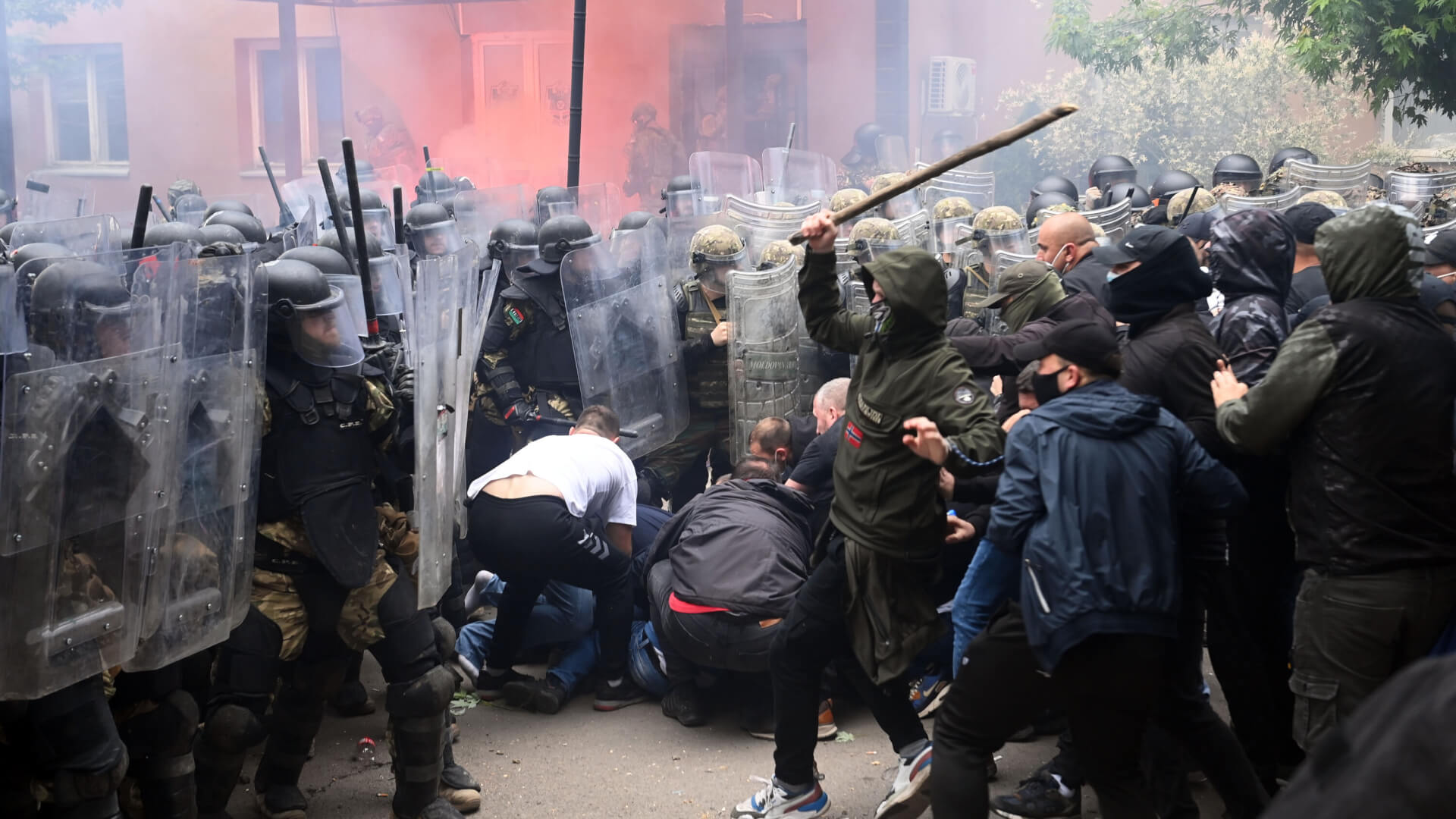NATO’s Joint Force Command (JFC) Naples confirmed the deployment of reserve troops to Kosovo to supplement the peacekeeping mission of the NATO-led Kosovo Force (KFOR). NATO Secretary General Jens Stoltenberg later validated the report, stating 700 soldiers would be deployed to the Balkan country.
According to the sources, NATO is sending additional troops to Kosovo after a confrontation injured KFOR personnel. As Kosovo police escorted ethnic Albanian mayors into Serb-majority towns and cities, violent riots broke out.
NATO Deploys Additional Troops in Kosovo
After meeting with Norwegian PM Jonas Gahr Store on Tuesday, Stoltenberg informed reporters in Oslo, “We have decided to deploy 700 more troops from the operational reserve force for the Western Balkans.”
“In response to recent unrest and the injury of 30 members of NATO’s Kosovo Force, NATO has directed the deployment of the Operational Reserve Forces (ORF) for the Western Balkans, which was on a seven-day readiness-to-deploy status,” JFC Naples confirmed. It added that another reserve battalion would be ordered to enhance readiness, equipping it to deploy in seven days if necessary.
NATO-led peacekeepers step up security in northern Kosovo.
— AFP News Agency (@AFP) June 1, 2023
Hundreds of ethnic Serbs have gathered again to demand the withdrawal of Kosovo special police forces and the ethnic Albanian mayors they do not consider their true representatives. Earlier this week clashes left more… pic.twitter.com/fdMBu4Ne4I
Allied JFC Naples commander Admiral Stuart B. Munsch claimed, “The deployment of additional NATO forces to Kosovo is a prudent measure to ensure that KFOR has the capabilities it needs to maintain security in accordance with our UN Security Council mandate.”
Munsch appreciated KFOR for “taking swift, restrained, and professional action to intervene to stop the unrest and save lives.” He added, “The violence must stop, and all sides must stop taking actions to undermine the peace in any and all communities of Kosovo.”
NATO Peacekeeping Troops Injured in Kosovo
In Kosovo, tensions between ethnic Serbs and Albanians are rising, with NATO-led troops hurt in clashes with Serb protestors. Earlier, significant police troops were stationed in the Serb-populated districts of Kosovo.
On Monday, the NATO-led peacekeeping force KFOR clashed with protestors in northern Kosovo, where the Serb minority is protesting the election of ethnic Albanian mayors in Serb-majority regions. The Serb communities had boycotted the election, which resulted in the appointment of new mayors.
KFOR appears to have deployed tear gas and stun grenades on protestors in Zvecan, a Serb-dominated town 45 kilometres (28 miles) from Pristina. As stated by KFOR, “around two” members of the “multinational contingent” were injured during the altercation.
“While countering the most active fringes of the crowd, several soldiers of the Italian and Hungarian KFOR contingent were the subject of unprovoked attacks and sustained trauma wounds with fractures and burns due to the explosion of incendiary devices,” KFOR wrote.
NATO Deploys Additional Forces to Kosovo Force
— NATO JFC Naples (@JFC_Naples) May 30, 2023
In response to recent unrest and the injury of 30 members of
NATO’s Kosovo Force, NATO has directed the deployment of the Operational Reserve
Forces (ORF) for the Western Balkans, which was on a seven-day readiness-to-deploy
status.
Why Are the Serbs Protesting?
Kosovo’s conflict started in 1998, when separatist ethnic Albanians rose against Serbia’s rule, provoking the latter to respond with a violent crackdown. Nearly 13,000 people were killed, the majority of them were ethnic Albanians. NATO’s military intervention in 1999 finally compelled Serbia to withdraw from the region, facilitating the establishment of the KFOR peacekeeping mission.
Serbia has refused to accept Kosovo’s proclamation of independence from Serbia in 2008. The majority of the population is ethnic Albanian; however, in the region of Kosovo that borders Serbia to the north, there is a restless Serb minority.
Serbs in the region have long intended to implement a 2013 agreement mediated by the EU to establish an association of autonomous municipalities in their territory.
In the fresh round of tensions, Serbs refused to participate in April’s local elections as a protest against the denial of their demands for autonomy. With only 3.5 percent of registered voters, ethnic Albanian candidates could win mayoral elections in four Serb-majority communities.
Giant Serbian tricolor unfurled in protest against NATO troops in Kosovo
— RT (@RT_com) June 1, 2023
Follow us on Rumble: https://t.co/Nuc9nUzTc5 pic.twitter.com/4stZDGOUx0
Russia Supports Kosovo’s Serbs
Kremlin spokesperson Dmitry Peskov stated that Russia supports Kosovo’s Serbian population and believes its legal rights and interests must be preserved. “We support Serbia and the Serbs unconditionally...We consider that all legal rights and interests of the Kosovo Serbs must be observed,” Peskov said in a daily news briefing, adding that there must be no room for “provocative actions.”
Further, the Russian Foreign Ministry asked “the West to finally silence its false propaganda and stop blaming incidents in Kosovo on Serbs driven to despair, who are peaceful, unarmed, and trying to defend their legitimate rights and freedoms.”
Serbia and its longstanding ally Russia refuse to acknowledge Kosovo’s independence. Moscow rejected Kosovo’s ambition to join the UN, while Serbia still considers Kosovo part of its territory.
Russia, which has significant ties with Serbia, an Orthodox Christian country with which it shares cultural and religious relations, blamed Kosovo and Western nations for the escalating tensions in the Balkans.

